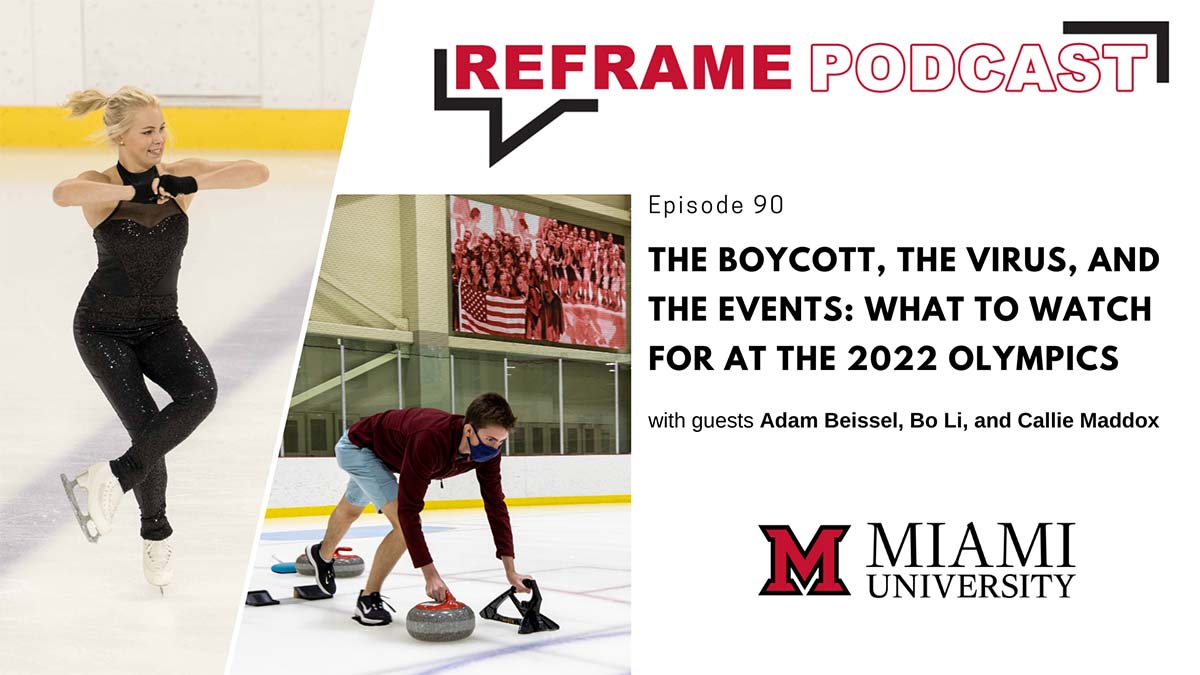How geopolitics, the pandemic, and gender equality will impact the 2022 Beijing Winter Olympics
Miami University Sport Leadership and Management (SLAM) experts speak about the 2022 Winter Games, including the U.S. diplomatic boycott, COVID-19, and more

How geopolitics, the pandemic, and gender equality will impact the 2022 Beijing Winter Olympics
The Olympics are often seen as a way to cultivate global peace and understanding through athletic achievement. However, they are also often leveraged as a political and economic tool by nations and organizations seeking to advance their own agendas. Miami University faculty discuss the issues and challenges around the 2022 Beijing Winter Games, including the U.S. diplomatic boycott due to human rights violations, COVID, and issues involving gender, equality, and access among athletes.
Adam Beissel, SLAM assistant professor, is an expert on the geopolitical economy of global sport and the global politics of international sport
“We’ve witnessed a momentous shift in U.S. public attitudes toward China over the past decade. A ‘tough on China’ approach enjoys bipartisan support – perhaps one of the few consensus issues shared among both political parties. When the Biden administration announced the diplomatic boycott, it was supported by many Democrats, and it served as a response to Republicans who maybe think he’s not being tough enough on China. So we can situate Beijing 2022 in an ongoing saga where sport becomes a lens through which wider external China-U.S. diplomatic relations and internal U.S. politics play out.”
“If we compare the 2008 Beijing Games to 2022, we are in a radically different geopolitical context. In 2008, U.S. attention was largely on the Middle East and the Iraq War. Now the U.S. sees China as a threat to economic supremacy and political influence in the world, even perhaps the U.S.’s primary geopolitical adversary, much like we saw in the Middle East in the early 2000s, or the Soviet Union around the Cold War. That provides a different context for us to understand these Games.”
“Sport mega events like the Olympics have always been a source of nationalism for political parties in power. At a time when support for the current political regime in China may be abating a bit, and when the Chinese economy has slowed, Xi Jinping and the Chinese government see this as an opportunity to show strength and to express a sense of national identity and belonging. That internal/external dynamic is certainly at play.”
Bo Li, SLAM assistant professor, is co-editor of the book, Sport and the Pandemic: Perspectives on Covid-19's Impact on the Sport Industry
“COVID will be a big test for China. Since the pandemic, China has canceled all international competitions, so they have no experience hosting an international event during the pandemic. It will be interesting to see how they are able to handle the pressure and if their COVID policy will change after the Olympics.”
“The COVID strategy utilized during the Tokyo Games was very successful and Beijing learned a lot from Japan. Some policies like screen testing, house monitoring, and contact tracing are very similar. But China is one of the only countries in the world using the zero-COVID policy, and Beijing has made even stricter rules by requiring all athletes be vaccinated or to quarantine for 21 days.
“Tokyo did not allow audiences, but Beijing wants these Games to be very successful. International travelers are not allowed into China, but they will allow audiences for domestic ticket holders. That is another big difference.”
Callie Maddox, SLAM assistant professor, is an expert on the socio-cultural study of sport, physical activity, leisure, and embodiment
“The Olympic program changes with each iteration of the Games, and there will be new mixed-gender events in this Winter Olympics. A key driving factor in our saturated sporting viewing landscape is how to get more young people interested. The IOC and NBC are very cognizant of that, and these mixed-gender events will help get people to watch.”
“The mixed-gender events are also part of the IOC’s larger plan to move towards true gender parity. It's a strategic plan to get more women to compete. It's a positive step, but it's falling a bit short. Women still have the opportunity to win fewer medals than men.”
“We don't often recognize the significant barriers that are in place for American athletes. Our Olympic structure in this country is essentially privatized. Athletes do not get public support. Those who come from the middle/upper middle class have an advantage in terms of resources, access to ski slopes, equipment, training, and the ability to travel. We don't often want to peel back those layers, and understand that our athletes only represent only a small slice of America.”
Listen to these experts on the ReFrame podcast episode "The Boycott, The Virus, and The Events: What to Watch for at the 2022 Olympics"